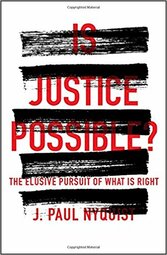I care deeply about justice, as does the congregation I'm a part of. For this reason, I was excited to dig into J. Paul Nyquist's Is Justice Possible: The Elusive Pursuit of What is Right.

This book was a mixed bag for me. I loved that its starting point was Scripture. As Nyquist writes, “While administered by man, justice is not rooted in man. Justice is ultimately rooted in God and His righteousness.” Those seeking to understand more of what Scripture says about justice will particularly appreciate the first and fourth sections of this book, What is justice? and Will we ever see justice?
I also really appreciated that many of Nyquist's examples of injustice come from our legal system and specifically deal with race. He reminds readers, “A country that abolished slavery 150 years ago now has a greater number of black men in the correctional system than there were slaves in 1850, and a greater percentage of its black population in jail than was imprisoned in apartheid South Africa. Black, male, and no high school diploma? It's more likely than not that you will spend time in prison during your life.”
Racism is an issue that Christians – especially the evangelical world – needs to continually work to better understand and address. Nyquist's chapter on implicit bias is, from my perspective, worth the price of the book. In it, Nyquist defines implicit bias as “the unconscious attitudes or stereotypes that affect our decisions and actions.” He then explores a number of ways in which implicit bias lead to injustices in our health care system (where Asian Americans die of cancer more than any other ethnic group but “are the least likely to be recommended for cancer screenings”), education system (where “More African American students receive more out-of-school suspensions and expulsions than white students”), housing system, and employment system (where “a resume with a prototypically African American-sounding name must be submitted to 50% more companies than the exact same resume with a prototypically white-sounding name.”) Understanding implicit bias is key to combatting systemic racism and the injustices that result from it.
Although I disagreed with some of it, I also appreciated Nyquist's chapter, Doing Justice in the Political Arena. Nyquist is right in that “Citizens participate in the process – and thereby the establishment of of justice – through the election of the president, senators, representatives, governors, mayors, and, in certain cases, judges.” The rub for me in this chapter, as with much of the book, are the issues that Nyquist establishes as the ones God cares about. He includes several that I do not agree are justice issues (like individual liberty) while leaving out others that I think God is very concerned about (like poverty issues and immigration / refugees). Nyquist's list of God's concerns will challenge conservative Christians but frustrate socially progressive Christians, who I fear will reject many of Nyquist's valid points because of what he includes and excludes in this list.
Despite this, Is Justice Possible? is a book I will continue to draw from in my work as a youth pastor as I teach others about justice. Because of its short length and controversial nature, it would also make for a thought-provoking book to discuss in a small group.
*******************************************************
Disclosure: I received a free copy of Is Justice Possible in exchange for a fair and honest review.